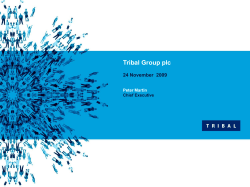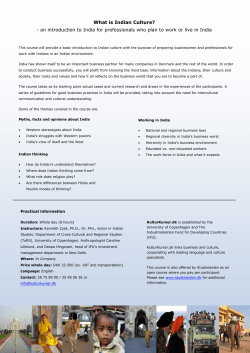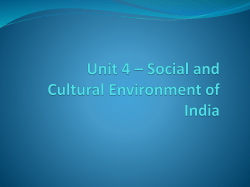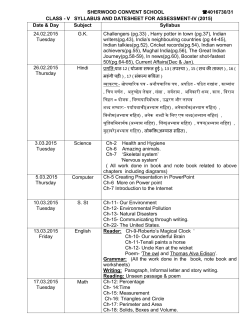
TRIBAL AND INDIAN COUNTRY ENERGY DEVELOPMENT:
CONFERENCE TRIBAL AND INDIAN COUNTRY ENERGY DEVELOPMENT: COLLABORATING FOR SUCCESSFUL TRANSACTIONS February 24-25, 2015 Hotel Andaluz Albuquerque, NM Pre-Conference Workshop I FINANCING TRIBAL ENERGY PROJECTS February 23, 2015 Pre-Conference Workshop II NAVIGATING RIGHTS-OF-WAY (ROWS) ON TRIBAL LAND: KEYS TO SUCCESSFUL PARTNERSHIP February 23, 2015 EUCI is authorized by IACET to offer 1.0 CEUs for the conference and 0.3 CEUs for each workshop. Supporting Organization 1 TRIBAL AND INDIAN COUNTRY ENERGY DEVELOPMENT February 24-25, 2015 Albuquerque, NM OVERVIEW Lands that have been permanently set aside for the use of Native Americans, known variously as “tribal lands” and “Indian country”, also turn out to be a vital energy resource. There are four types of such lands: 1. 2. 3. 4. Those under the supervision of the United States government, held under the auspices and guardianship of the Bureau of Indian Affairs Allotted lands that are subject to state and local taxation Restricted status lands, where title to the land is held by an individual Indian person or tribe State Indian reservations, lands held in trust by a state for an Indian tribe Taken together, these lands are estimated to hold about 20 percent of the nation’s extractable fossil fuels, and 10 percent of its renewable resources. While oil and gas exploration has occurred on many of these lands over the past several decades, recent government measures have stimulated more expansive energy development. These measures have introduced specific economic incentives to elevate the traditional role of Southwestern tribes to become more active in energy development transactions on their lands. Consequently, many tribal organizations and Indian country decisionmakers are now actively pursuing ways in which to bring energy security and economic development to their homelands. This conference will provide practical tips for mutually beneficial collaboration between tribes and those working in the power industry who recognize the special opportunities available to leverage the considerable energy resources of Indian country in the southwestern U.S. Its particular focus will be fundamental concepts on how to network and collaborate with tribal officials for successful business ventures and trends in the areas of solar, wind, biomass and natural gas in Indian country. In addition, it will present a review of the regulatory process, working with different models of tribal business enterprises, right-of-way contracts, and distributed generation opportunities on tribal land. The program will especially appeal to tribal representatives, project developers, utilities, industry consultants and government agencies interested in working effectively in this specialty area. WHO SHOULD ATTEND • • • • • • • • • • Tribal land owners and officials Independent power producers and transmission operators Federal, state, county and local regulatory agencies involved in the administration of Indian affairs Utility professionals involved with generation and procurement of power Financial and legal professionals interested in cleantech development Energy consultants, project managers and engineers Permitting and siting professionals Energy service companies Renewable energy trade associations Tribal advocacy groups The depth and scope of the topics were presented in a manner conducive to open and honest conversation. This will positively enhance my future endeavors with tribes and other stakeholders.” – Director of Public Affairs, Rosement Copper Co. 2 TRIBAL AND INDIAN COUNTRY ENERGY DEVELOPMENT February 24-25, 2015 Albuquerque, NM LEARNING OUTCOMES • • • • • • • • • • • • • • Recognize cultural complexities of tribal engagement and practical tips for successful business transactions in Indian land Describe current legislation and policy that governs development relationships in Indian country Identify unique legal issues that arise when doing business in Indian country Gain awareness of the various tribal business enterprises, collaborative models, and legal structures Assess the types of tribal energy projects and joint ventures Identify what tribal developers are looking for in an energy develoment deal Examine developers accounts of doing business on Indian land Review federal and regional jurisdictions involved in energy development on tribal land Discover what utilities and merchant providers are doing to foster positive tribal relationships Assess challenges and opportunities for rural electrification and distributed generation on Indian country lands Examine the latest sustainable energy and natural gas trends Review project case studies regarding EUCI put together a great group of speakers with diverse, o Tribal renewable installations interesting perspectives on working with tribes.” o Tribal utility formation – Manager – Cultural Resource Group, URS Corp. o Tribal natural gas projects Identify available financing opportunities Apply methods for developing mutually beneficial negotiations between tribes and utilities concerning right-of-way (ROW) contracts AGENDA Tuesday, February 24, 2015 7:30 – 8:00 a.m. Registration and Continental Breakfast 1:00 – 1:15 p.m. Opening Remarks 8:00 – 8:30 a.m. Welcome and Keynote Address This training was very helpful in understanding the laws that apply to Indian tribes and corporations that want to work on tribal lands. And also the people from other tribes and companies that I talked with and met shared information.” – Director, Acoma Natural Resource - Pilar Thomas, Director – Office of Indian Energy Policy and Programs, U.S. Department of Energy (invited) I. 8:30 – 10:00 a.m. Cultural Considerations of Tribal Engagement and Indian Country Business Round-Table Discussion: Relationship of Cultural Awareness to Development Success Cultural awareness is a greater understanding, sensitivity, and appreciation of the varied patterns of living, history, attitudes and experiences of groups that include race, ethnicity, and religion. When it comes to establishing and achieving collaborative ventures with tribal entities, cultivating a cultural awareness of the tribes’ beliefs, values and traditions is instrumental in promoting a better business environment and successful transactions. Furthermore, Native American culture is traditionally embedded in environmental attitudes and perspectives that can have profound implications for land use and energy development decisions. A diverse panel of experts will explore the relationship of cultural awareness to development success on tribal and Indian lands, and share their insights on how to cultivate a sense of cultural appreciation, awareness, and open-mindedness specifically in this context. - Chris Deschene, Deschene Consulting LLC, Law Offices of Schaff & Clark - Milton Bluehouse Jr., Senior Consultant, Triangle Associates - Jon Berkin, Ph.D., Principal, Natural Resource Group LLC - Ron Maldonado, Tribal Historic Preservation Officer, Navajo Nation Tribal Historic Preservation Office - Michelle L. Holiday, President, Michelle Holiday & Associates 3 TRIBAL AND INDIAN COUNTRY ENERGY DEVELOPMENT February 24-25, 2015 Albuquerque, NM AGENDA Tuesday, February 24, 2015 (Continued) 10:00 – 10:30 a.m. Networking Break An excellent introduction to issues of developing energy projects on tribal lands.” – Partner, DLA Piper 10:30 a.m. – 12:00 p.m. Unique Legal Issues in Indian Country The basis for conducting any business with parties involving tribal and Indian country lands goes well beyond the technical knowledge required to perform the necessary services required. This conference segment will give an overview of the significant legal issues impacting development on tribal land. Specifically, it will identify the issues relating to tribal sovereignty, immunity, trust responsibility, and jurisdiction. - Nancy Appleby, Founder and Managing Member, Appleby Law PLLC 12:00 – 1:15 p.m. Group Luncheon Featured Speaker: Jasper Schneider, Acting Administrator- Rural Utilities Service, United States Department of Agriculture 1:15 – 3:00 p.m. Mutually Beneficial Projects Types, Joint Ventures and Utility Formation This discussion will give a brief overview of the different models of tribal energy projects, while primarily focusing on financing, joint ventures and ‘the flip structure.’ The flip structure combines the methods of contracting out and tribal ownership on a project, which can be an ideal way to go for mutually beneficial financial rewards. This segment will also give an overview on the technicalities and formation of tribal utilities. - John Clancy, Partner, Godfrey & Kahn - Martin Bailey, Real Property Manager, SouthWestern Power Group 3:00 – 3:15 p.m. Afternoon Break 3:15 – 4:15 p.m. Successful Tribal Relationships: Utilities and Merchant Providers This panel will focus on how to establish successful industry-tribal relationships for the long-term. Utility and merchant energy companies will discuss their efforts to engage and collaborate with tribal and Indian country jurisdictions on energy development projects. - Michelle L. Holiday, President, Michelle Holiday & Associates - Cathy Newby, Tribal Government-Government and Customer Engagement, PNM - Arvin Trujillo, Manager of Government Relations, APS 4:15 – 5:30 p.m. A very detailed, interesting conference.” – Principal Planner, San Xavier District of the Tohono O’Odham Nation Roundtable Discussion: Tribal Members and Project Developers A panel of tribal members and developers who have been involved in tribal energy development in the Southwest will discuss their experience. This lively discussion will examine varying development perspectives of tribes and project developers, discuss region-specific trends, and what tribes are looking for in a deal. Integrated in this panel will also be a developer’s first-hand account of energy development in Indian Country. - Perry Fontana, Vice President, RES Americas - Michael Connolly, Senior Economic Analyst, Campo Kumeyaay Nation - Martin Bailey, Real Property Manager, SouthWestern Power Group - Rod Ariwrite, Economic Development Director, Fallon Tribal Development Corp. - John Lewis, Board Chairman, Gila River Indian Community Utility Authority Ronald Wopsack, Vice Chairman, Ute Tribal Business Committee (invited) 4 TRIBAL AND INDIAN COUNTRY ENERGY DEVELOPMENT February 24-25, 2015 Albuquerque, NM AGENDA Wednesday, February 25, 2015 7:30 – 8:00 a.m. Continental Breakfast II. Great information for both tribes and industrial partners and developers who wish to engage and work with tribes.” – Chairman GRICUA Technical Complexities, Trends, and Case-Studies 8:00 – 10:00 a.m. Review of the Regulatory Layers When doing business in Indian country for energy development purposes, there are very prescribed layers of regulation and jurisdiction that need to be attended to. This segment will provide an overview of federal and regional specific jurisdiction, environmental regulations, and how to navigate the National Environmental Policy Act (NEPA process. - Stan Webb, Regional Realty Officer, U.S. Bureau of Indian Affairs (BIA) - Tamera Dawes, Realty Specialist, U.S. Bureau of Indian Affairs (BIA) 10:00 – 10:15 a.m. Morning Break 10:15 a.m. – 12:15 p.m. Challenges and Opportunities for Rural Electrification, Microgrids, Distributed Generation and Sustainable Energy Development Tribal and Indian country lands are frequently located in communities that are remote from urban areas. Homes are often dispersed over large areas, far from a utility grid. Due to the high cost of utility distribution lines and sparse development patterns, it is often cheaper to power remote areas with distributed power generation applications. This panel will engage in a discussion of the challenges, opportunities, and trends for rural electrification as well as options that exist for microgrid/distributed generation application. It will also address renewable and sustainable energy development trends on tribal and Indian country lands. - Bill Anderson, Director of Business Development, Eaton Corporation - Tara Kaushik, Partner, Holland & Knight 12:15 – 1:30 p.m. Group Luncheon 1:30 – 2:30 p.m. Natural Gas Development in Indian Country This segment will review recent natural gas trends and opportunities in Indian Country, and the role of natural gas development in replacing coal-fired generation on reservations. - Brian Lewis, Attorney, General Counsel, Navajo Oil and Gas 2:30 – 3:15 p.m. Cultural Practices and Environment Considerations in Working With Tribes on Energy Projects Dealing with permitting and environmental issues during the planning and execution of energy infrastructure development projects on tribal lands requires more than just an open mind, effective communications skills, and knowledge of conventional regulatory practices. Awareness of—and appreciation— of the heritage, customs, and land use practices particular to tribes also is an essential component to working successfully with tribal governments. This presentation will discuss how to identify and approach these often non-transparent cultural issues. It also will provide an overview of key crosscultural communication skills and review lessons learned from working over the past 20 years on energy development projects on the Navajo Nation. - Jon Berkin, Ph.D., Principal, Natural Resource Group, LLC - Ron Maldonado, Tribal Historic Preservation Officer, Navajo Nation Tribal Historic Preservation Office 3:15 – 3:30 p.m. Afternoon Break 3:30 – 5:15 p.m. Tribal Energy Development Case Studies • Learning from the Navajo and Hopi: Challenges to Renewable Energy Development - Tara Kaushik, Partner, Holland and Knight • All Over the Map: Case Study of Unique Tribal-Private Sector Energy Partnership - Mark Romero, Chairman, Mesa Grande Band of Mission Indians • The Campo Band of Mission Indians: Commercial Scale Wind Projects and Net Metering - Michael L. Connolly, Senior Economic Analyst, Campo Kumeyaay Nation • Renewable Energy Development Project Feasibility: Tribal vs. Allotted Lands with the Gila River Indian Community Utility Authority - John Lewis, Board Chairman, Gila River Indian Community Utility Authority Moderator: Milton Bluehouse Jr., Senior Consultant, Triangle Associates 5:15 p.m. Conference Adjourns 5 TRIBAL AND INDIAN COUNTRY ENERGY DEVELOPMENT February 24-25, 2015 Albuquerque, NM PRE-CONFERENCE WORKSHOP I: FINANCING TRIBAL ENERGY PROJECTS MONDAY, FEBRUARY 23, 2015 OVERVIEW Financing tribal energy development projects is a challenging process that involves comprehensive, project-specific planning. There are many considerations involved in this process that will ultimately lead to the success or failure of a project. Thus, a thorough understanding of financing concepts is important for all involved parties. This workshop will guide attendees through the technicalities of this process, providing an overview of financing mechanisms available for renewable and traditional energy development. It will also take a critical look at special financing considerations that arise when doing business in Indian Country. Furthermore, this workshop will give an overview of broader economic implications to consider when developing tribal energy resources, and methods to keep wealth within the tribal community. LEARNING OUTCOMES • • • • • • • • • • Review financing concepts and tools that apply to energy development in Indian Country Recognize the special issues involved in financing energy development in Indian Country and how to navigate these issues for successful project management Analyze the role of investor criteria, equity and debt financing Identify information and due diligence requirements Assess how to benefit from tax credits and other incentives Examine funding opportunities for both renewable and traditional energy facilities, certification and transfers of renewable energy credit Explain the Dept. of Energy’s Grant Application process and financing incentives available for Tribal communities Assess the broader economic implications of energy development in Indian Country Identify mechanisms to keep money within the Tribal community Analyze future energy development and collaboration trends in Indian Country WORKSHOP AGENDA 8:00 – 8:30 a.m. 8:30 – 11:45 a.m. Registration and Continental Breakfast Workshop Timing I. Investor Criteria II. Equity and Direct Financing III. Information and Due Diligence Requirements A. Site control/permitting issues B. Availability and cost of fuel resources C. Revenue/offset costs from power sales D. Financial Resources IV. How to Benefit from Tax Credits and Other Incentives A. Tax Equity B. Investment Tax Credits C. Accelerated Depreciation D. Grants and Other Non-Tax Incentives E. Tax-Exempt Debt V. Understanding the DOE and other Grant Application Processes VI. Self-Financing Mechanisms VII. Tribal Economic Implications VIII. Future trends 6 TRIBAL AND INDIAN COUNTRY ENERGY DEVELOPMENT February 24-25, 2015 Albuquerque, NM WORKSHOP INSTRUCTORS John Clancy / Partner / Godfrey & Kahn John L. Clancy is a shareholder and the leader of the Environment & Energy Strategies Practice Group. He provides environmental and energy-related services to a wide variety of entities, including industrial, commercial, tribal, municipal and trade association clients. In the environmental arena, Mr. Clancy has represented clients with respect to a wide variety of traditional environmental issues, including brownfield redevelopment, mining and mining waste matters, solid waste landfill siting, solid and hazardous waste site closure and site remediation, and has provided National Environmental Policy Act, Superfund, RCRA, Clean Water Act, and Clean Air Act counseling and litigation services. He received the 2004 Leader in Law award from the Wisconsin Law Journal for his successful representation of the Forest County Potawatomi Community with respect to their opposition of the proposed Crandon Mine. Mr. Clancy’s energyrelated work includes advice regarding funding opportunities for renewable energy and large energy efficiency projects, the siting of both renewable and traditional energy facilities, negotiation of power purchase agreements, purchases and sales of energy facilities, certification and transfers of renewable energy credits, negotiation of co-generation facility agreements, land use disputes regarding the siting of transmission lines and related facilities, negotiation of individualized energy tariffs, intervention in regulatory rate cases and advice regarding tribal energy issues and development. Michael L. Connolly / Senior Economic Analyst / Campo Kumeyaay Nation Michael Connolly is a member of the Campo Kumeyaay Nation and resides on the Reservation. He works for Campo as a Senior Economic Analyst and as a consultant through his S-corporation, Laguna Resource Services, Inc. He has worked on the Kumeyaay Wind project that is currently in operation, as well as the Shu’luuk Wind project and the Golden Acorn Casino, a net meter turbine in operation. He has consulted with tribes exploring renewable energy in California, Arizona, New Mexico, and South Dakota, as well as consulted on off-Reservation energy projects. Mr. Connolly has served on the Campo Tribal Council as treasurer, the National Congress of American Indians as Co-Chair of the Natural Resources Committee, and National Tribal Environmental Council. James Duffy / Partner / Nixon Peabody James F. Duffy is a partner in the Boston office of the national law firm, Nixon Peabody LLP. He serves as the Chair of the firm’s Renewable Energy Tax Credit Team and concentrates his practice on structuring and closing transactions involving federal income tax credits and other significant federal and state income tax incentives, including Production Tax Credits for wind and other forms of renewable energy, Energy Investment Tax Credits for solar and certain other forms of renewable energy, as well as Treasury cash grants in lieu of Energy Investment Tax Credits. His practice also covers New Markets Tax Credits, Historic Rehabilitation Tax Credits, and Low-Income Housing Tax Credits. He has represented numerous developers, investors, syndicators and lenders in structuring and closing renewable energy and other transactions and is a frequent speaker on tax-oriented investment structures at renewable energy industry conferences and seminars, including conferences sponsored by the American Wind Energy Association (AWEA), the New York Solar Energy Industries Association (NY SEIA), the Environmental Business Council of New England (EBC), Power-Gen, the American Bar Association (ABA), the Institute for Professional Education and Development (IPED) and many others. He is a member of the American, Massachusetts, and Boston Bar Associations. Mr. Duffy has served as the chair of the Equity Finance Committee of the Real Estate Section of the Boston Bar Association and as a member of the Real Estate Steering Committee of the Boston Bar Association and is admitted to practice in Massachusetts. He is a graduate of the University of Rhode Island, B.A., summa cum laude (1978), and The Harvard Law School, J.D. (1981). 7 TRIBAL AND INDIAN COUNTRY ENERGY DEVELOPMENT February 24-25, 2015 Albuquerque, NM PRE-CONFERENCE WORKSHOP II: NAVIGATING RIGHTS-OF-WAY (ROWs) ON TRIBAL LAND: KEYS TO SUCCESSFUL PARTNERSHIP MONDAY, FEBRUARY 23, 2015 OVERVIEW This workshop will explore in-depth how to successfully navigate right-of-ways (ROWs) over tribal lands for all parties involved. It will analyze tribal jurisdiction, the evolving role of the Bureau of Indian Affairs, and how to develop mutually beneficial negotiations between tribes and utilities. Recently proposed regulations and possible implications of these regulations will also be addressed. LEARNING OUTCOMES • • • • • • • • • Recognize tribal landowner’s perspectives and the importance of dealing with unique differences and their needs/ concerns Examine the historical right-of-way (ROW) trends and BIA approval process Review evolving ROW trends and recently proposed regulations Identify best practices for acquiring and managing ROW for electric transmission Evaluate best practices for managing a road system, working with multiple managers and uses Assess methods to negotiate easements for ROW in Indian Land Discuss best practices for stakeholder outreach Define successful protocols for outreach strategies Develop strategies for establishing a positive message and the various ways it must be communicated WORKSHOP AGENDA 12:30 – 1:00 p.m. 1:00 – 4:45 p.m. Registration Workshop Timing I. Acquiring and Managing ROWs for Electric Transmission II. Managing a Road System — Working with Multiple Managers and Uses III. Negotiating Easements for ROWs in Indian Country IV. Tribal Authority and the Energy Policy Act of 2005 V. BIA Approval Process VI. State ROW Manuals and Region Specific Policies VII. BIA Proposed Action Rule (79 FR 34455) A. To streamline the ROW process VIII. BLM’s Proposed Action Rule (43 CFR Parts 2800 and 2880) A. To remake the agency’s regulations governing the acquisition of solar and wind project ROW on federal land 8 TRIBAL AND INDIAN COUNTRY ENERGY DEVELOPMENT February 24-25, 2015 Albuquerque, NM WORKSHOP INSTRUCTORS Martin Bailey / Real Property Manager / SouthWestern Power Group Mr. Bailey is the Real Property Manager for SouthWestern Power Group. He is responsible for all real estate related activities associated with SouthWestern Power Group’s development activities. He has more than 20 years of experience in real estate and property management and the development of real estate assets. He served as a director for several Native American councils and organizations promoting resource management and economic development. His previous positions include Director of Real Estate Services for the Fort Mojave Indian Tribe; Coordinator and Land Use Specialist for the Colorado River Indian Tribes; and Senior Appraiser and Development Officer for Bank of America, G.I.S. Mr. Bailey received a B.A. in Agricultural Business Management from California Polytechnic State University at Pomona. Stan Webb / Regional Realty Officer / U.S. Bureau of Indian Affairs (BIA) Stan Webb is the Realty Officer at the BIA’s Western Regional Office in Phoenix, Arizona, a position he has held for most of the last 20 years. He has also worked in the private practice of Federal Indian Law, and at the BIA’s Central Office in Washington, D.C., and BIA agencies in Minnesota and Wisconsin. He received undergraduate and law degrees from the University of Kansas and has a Master in Public Administration degree from Harvard University’s Kennedy School of Government. Mr. Webb is a member of the State Bar of Arizona and the Cherokee Nation of Oklahoma and holds the CCIM designation awarded by the Commercial-Investment Real Estate Institute. Tamera Dawes / Realty Specialist / U.S. Bureau of Indian Affairs (BIA) Tamera Dawes is the Regional Realty Specialist at the Bureau of Indian Affairs Western Regional Office in Phoenix, Arizona. She is the lead contact for rights-of-way, land use planning and energy related transactions and assists in environmental documentation review and project management. She has over 16 years of experience working in the non-profit, tribal, private and federal arena with specific attention to environmental, land use planning, economic development and policy development and analysis. She is a graduate of Arizona State University. Click Here to Register Online 9 TRIBAL AND INDIAN COUNTRY ENERGY DEVELOPMENT February 24-25, 2015 Albuquerque, NM IACET CREDITS EUCI has been accredited as an Authorized Provider by the International Association for Continuing Education and Training (IACET). In obtaining this accreditation, the (organization name) has demonstrated that it complies with the ANSI/IACET Standard which is recognized internationally as a standard of good practice. As a result of their Authorized Provider status, (organization name) is authorized to offer IACET CEUs for its programs that qualify under the ANSI/IACET Standard. EUCI is authorized by IACET to offer 1.0 CEUs for the conference and 0.3 CEUs for each workshop. INSTRUCTIONAL METHODS Case studies, panel discussion, lecture on current topics, and interactive audience discussion through Q&A will be used REQUIREMENTS FOR SUCCESSFUL COMPLETION OF PROGRAM Participants must sign in/out each day and be in attendance for the entirety of the conference to be eligible for continuing education credit. EVENT LOCATION A room block has been reserved at the Hotel Andaluz, 125 Second St, NW, Albuquerque, NM 87102, for the nights of February 22-24, 2015. Room rates are $149, plus applicable tax. Call 1-877-987-9090 for reservations and mention the EUCI program to get the group rate. The cutoff date to receive the group rate is February 1, 2015, but as there are a limited number of rooms available at this rate, the room block may close sooner. Please make your reservations early. Click Here to Register Online Breakfast host Custom sponsorship opportunities are also available. Please contact Maggie Field at 720-988-1250 or mfield@euci.com for more information. PROCEEDINGS A copy of the conference proceedings will be distributed to attendees at the event. REGISTER 3 SEND 4TH FREE Any organization wishing to send multiple attendees to these conferences may send 1 FREE for every 3 delegates registered. Please note that all registrations must be made at the same time to qualify. 10 EVENT LOCATION A room block has been reserved at the Hotel Andaluz, 125 Second St, NW, Albuquerque, NM 87102, for the nights of February 22-24, 2015. Room rates are $149, plus applicable tax. Call 1-877-9879090 for reservations and mention the EUCI program to get the group rate. The cutoff date to receive the group rate is February 1, 2015, but as there are a limited number of rooms available at this rate, the room block may close sooner. Please make your reservations early. WWW.EUCI.COM P: 303-770-8800 F: 303-741-0849 PLEASE REGISTER THE FOLLOWING TRIBAL AND INDIAN COUNTRY ENERGY DEVELOPMENT AND BOTH PRE-CONFERENCE WORKSHOPS FEBRUARY 23-25, 2015: US $2295 EARLY BIRD ON OR BEFORE FEBRUARY 13, 2015: US $2095 TRIBAL AND INDIAN COUNTRY ENERGY DEVELOPMENT AND ONE WORKSHOP: PRE-CONFERENCE WORKSHOP I: FEBRUARY 23, 2015: US $1895 EARLY BIRD ON OR BEFORE FEBRUARY 13, 2015: US $1695 PRE-CONFERENCE WORKSHOP II: FEBRUARY 23, 2015: US $1895 EARLY BIRD ON OR BEFORE FEBRUARY 13, 2015: US $1695 TRIBAL AND INDIAN COUNTRY ENERGY DEVELOPMENT CONFERENCE ONLY FEBRUARY 24-25, 2015: US $1495 EARLY BIRD ON OR BEFORE FEBRUARY 13, 2015: US $1295 WORKSHOPS ONLY: PRE-CONFERENCE WORKSHOP I: FEBRUARY 23, 2015: US $595 EARLY BIRD ON OR BEFORE FEBRUARY 13, 2015: US $495 EUCI’s Energize Weekly e-mail newsletter compiles and reports on the latest news and trends in the energy industry. Newsletter recipients also receive a different, complimentary conference presentation every week on a relevant industry topic. The presentations are selected from a massive library of more than 1,000 Click Here to Register Online current presentations that EUCI has gathered during its 26 years organizing conferences. PRE-CONFERENCE WORKSHOP II: FEBRUARY 23, 2015:US $595 EARLY BIRD ON OR BEFORE FEBRUARY 13, 2015: US $495 Sign me up for Energize Weekly. How did you hear about this event? (direct e-mail, colleague, speaker(s), etc.) Print Name Job Title Company What name do you prefer on your name badge? City State/Province Telephone Address Zip/Postal Code Country Email List any dietary or accessibility needs here CREDIT CARD Name on Card Billing Address Billing Zip Code/Postal Code Account Number Billing City Exp. Date Billing State Security Code (last 3 digits on the back of Visa and MC or 4 digits on front of AmEx) OR Enclosed is a check for $______________________ to cover _________________ registrations. All cancellations received on or before April 18, 2014, will be subject to a US $195 processing fee. Written cancellations received after this date will create a credit of the tuition (less processing fee) good toward any other EUCI event or publication. This credit will be good for six months. In case of event cancellation, EUCI’s liability is limited to refund of the event registration fee only. For more infor871-0474. EUCI reserves mation regarding administrative policies, such as complaints and refunds, please contact contact our ouroffices officesatat(201) 303-770-8800. the right to alter this program without prior notice. 11
© Copyright 2025









